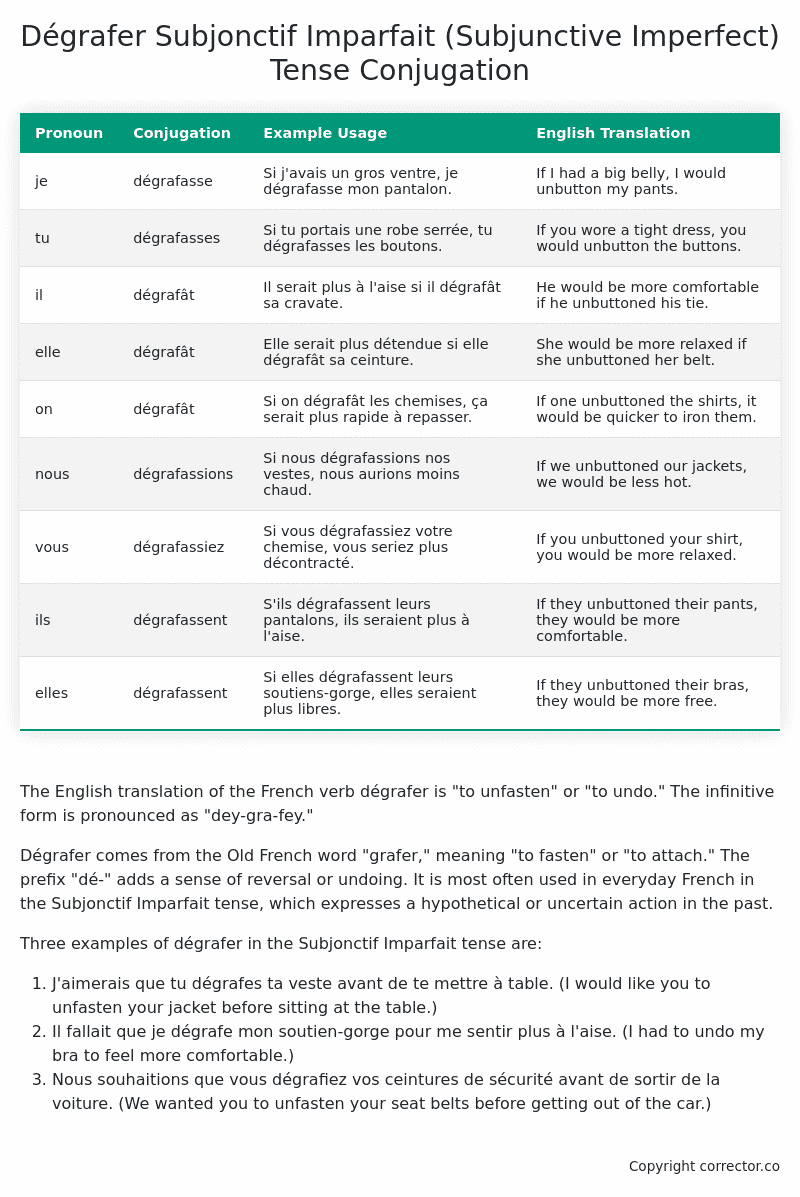Subjonctif Imparfait (Subjunctive Imperfect) Tense Conjugation of the French Verb dégrafer
Introduction to the verb dégrafer
The English translation of the French verb dégrafer is “to unfasten” or “to undo.” The infinitive form is pronounced as “dey-gra-fey.”
Dégrafer comes from the Old French word “grafer,” meaning “to fasten” or “to attach.” The prefix “dé-” adds a sense of reversal or undoing. It is most often used in everyday French in the Subjonctif Imparfait tense, which expresses a hypothetical or uncertain action in the past.
Three examples of dégrafer in the Subjonctif Imparfait tense are:
- J’aimerais que tu dégrafes ta veste avant de te mettre à table. (I would like you to unfasten your jacket before sitting at the table.)
- Il fallait que je dégrafe mon soutien-gorge pour me sentir plus à l’aise. (I had to undo my bra to feel more comfortable.)
- Nous souhaitions que vous dégrafiez vos ceintures de sécurité avant de sortir de la voiture. (We wanted you to unfasten your seat belts before getting out of the car.)
Table of the Subjonctif Imparfait (Subjunctive Imperfect) Tense Conjugation of dégrafer
| Pronoun | Conjugation | Example Usage | English Translation |
|---|---|---|---|
| je | dégrafasse | Si j’avais un gros ventre, je dégrafasse mon pantalon. | If I had a big belly, I would unbutton my pants. |
| tu | dégrafasses | Si tu portais une robe serrée, tu dégrafasses les boutons. | If you wore a tight dress, you would unbutton the buttons. |
| il | dégrafât | Il serait plus à l’aise si il dégrafât sa cravate. | He would be more comfortable if he unbuttoned his tie. |
| elle | dégrafât | Elle serait plus détendue si elle dégrafât sa ceinture. | She would be more relaxed if she unbuttoned her belt. |
| on | dégrafât | Si on dégrafât les chemises, ça serait plus rapide à repasser. | If one unbuttoned the shirts, it would be quicker to iron them. |
| nous | dégrafassions | Si nous dégrafassions nos vestes, nous aurions moins chaud. | If we unbuttoned our jackets, we would be less hot. |
| vous | dégrafassiez | Si vous dégrafassiez votre chemise, vous seriez plus décontracté. | If you unbuttoned your shirt, you would be more relaxed. |
| ils | dégrafassent | S’ils dégrafassent leurs pantalons, ils seraient plus à l’aise. | If they unbuttoned their pants, they would be more comfortable. |
| elles | dégrafassent | Si elles dégrafassent leurs soutiens-gorge, elles seraient plus libres. | If they unbuttoned their bras, they would be more free. |
Other Conjugations for Dégrafer.
Le Present (Present Tense) Conjugation of the French Verb dégrafer
Imparfait (Imperfect) Tense Conjugation of the French Verb dégrafer
Passé Simple (Simple Past) Tense Conjugation of the French Verb dégrafer
Passé Composé (Present Perfect) Tense Conjugation of the French Verb dégrafer
Futur Simple (Simple Future) Tense Conjugation of the French Verb dégrafer
Futur Proche (Near Future) Tense Conjugation of the French Verb dégrafer
Plus-que-parfait (Pluperfect) Tense Conjugation of the French Verb dégrafer
Passé Antérieur (Past Anterior) Tense Conjugation of the French Verb dégrafer
Futur Antérieur (Future Anterior) Tense Conjugation of the French Verb dégrafer
Subjonctif Présent (Subjunctive Present) Tense Conjugation of the French Verb dégrafer
Subjonctif Passé (Subjunctive Past) Tense Conjugation of the French Verb dégrafer
Subjonctif Imparfait (Subjunctive Imperfect) Tense Conjugation of the French Verb dégrafer (this article)
Subjonctif Plus-que-parfait (Subjunctive Pluperfect) Tense Conjugation of the French Verb dégrafer
Conditionnel Présent (Conditional Present) Tense Conjugation of the French Verb dégrafer
Conditionnel Passé (Conditional Past) Tense Conjugation of the French Verb dégrafer
L’impératif Présent (Imperative Present) Tense Conjugation of the French Verb dégrafer
L’infinitif Présent (Infinitive Present) Tense Conjugation of the French Verb dégrafer
Struggling with French verbs or the language in general? Why not use our free French Grammar Checker – no registration required!
Get a FREE Download Study Sheet of this Conjugation 🔥
Simply right click the image below, click “save image” and get your free reference for the dégrafer Subjonctif Imparfait tense conjugation!

Dégrafer – About the French Subjonctif Imparfait (Subjunctive Imperfect) Tense
Formation
Common Everyday Usage Patterns
Interactions with Other Tenses
Subjonctif Présent
Indicatif Passé Composé
Conditional
Conditional Perfect
Summary
I hope you enjoyed this article on the verb dégrafer. Still in a learning mood? Check out another TOTALLY random French verb conjugation!


